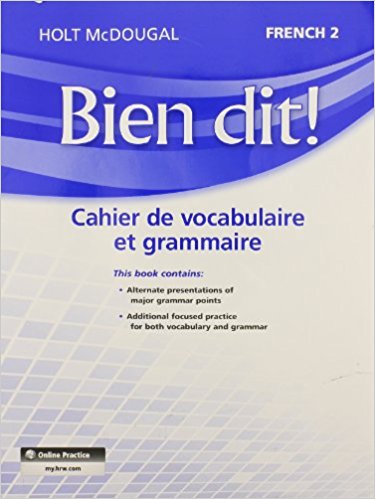
Bien dit!: Vocabulary and Grammar Workbook
1st Edition
ISBN: 9780547951843
Textbook solutions
All Solutions
Page 33: 21
Exercise 1
Step 1
1 of 5
In this exercise you have to answer the questions about your family by using the vocabulary you have learned so far. Your goal is to impress Mme Colignon with your knowledge of French language so try to write the complete sentences. You can simply take your family as a model.
Step 2
2 of 5
In this case Mme Colignon wants to know how many you are in your family? **Vous** êtes combien dans **votre** famille ?
Step 3
3 of 5
Watch out for the correct use of the personal pronoun (we – **nous**), the verb **être** (**sommes**) and the possessive adjective in the feminine singular (my – **ma**).
Step 4
4 of 5
You could eventually use the possessive adjective : **notre** famille (We are five in **our** family – Nous sommes cinq dans notre famille).
Step 5
5 of 5
Nous sommes cinq dans ma famille. / Nous sommes cinq dans notre famille.
Exercise 2
Step 1
1 of 4
Mme Colignon wants to know whether you have siblings. Brothers or sisters?
Step 2
2 of 4
In case you write more brothers or sisters than one, watch out how you write those numbers and keep in mind the plural endings, for ex.: J’ai deux frère**s** et trois soeur**s**.
Step 3
3 of 4
If you go for 1 brother and 1 sister, watch out for the feminine form of the number one: **un** – **une**, because the number “one” is the only number in French that needs to match the gender of the word it accompanies: **un homme – une femme.** Besides,*”un/une”* is both the number “one” and the indefinite article “a/an”.
Step 4
4 of 4
Oui, j’ai un frère et une soeur.
Exercise 3
Step 1
1 of 5
What are their names?
Step 2
2 of 5
The verb “**appeler**” in French can be used both in reflexive or non reflexive sense. In its non reflexive form it means “to call somebody or something”, for ex.: J’appelle ma mère.
Step 3
3 of 5
The reflexive meaning is “to be called”, “my name is” and in that case the verb has the reflexive pronoun – **se** attached (**s’appeler**), for ex.: Je m’appelle Tamara.
Step 4
4 of 5
In this particular case, the reflexive pronoun **se** is elided before the vowel -**a**, s’appeler. If the verb starts with a consonant the – **e** is not omitted: se lever, se laver, se promener, etc
Step 5
5 of 5
Mon frère s’appelle David et ma soeur s’appelle Alexandra.
Exercise 4
Step 1
1 of 2
What is your mother’s name?
Step 2
2 of 2
Ma mère s’appelle Mira.
Exercise 5
Step 1
1 of 3
And, what about your father, what is his name?
Step 2
2 of 3
She askes: *ton père*, and you have to change the possessive adjective **ton** into **mon** for masculine singular.
Step 3
3 of 3
Mon père s’appelle Velimir.
Exercise 6
Step 1
1 of 2
Mme Colignon wants to know whether you have a cat or a dog.
Step 2
2 of 2
Oui, j’ai un chat qui s’appelle Minou. Je n’ai pas de chien.
unlock

